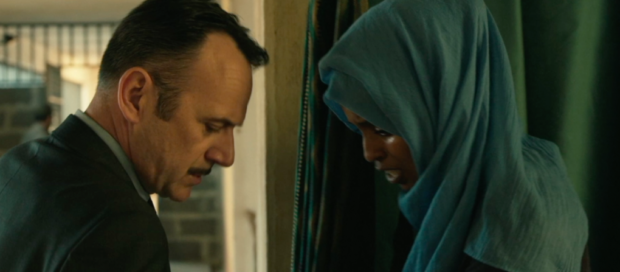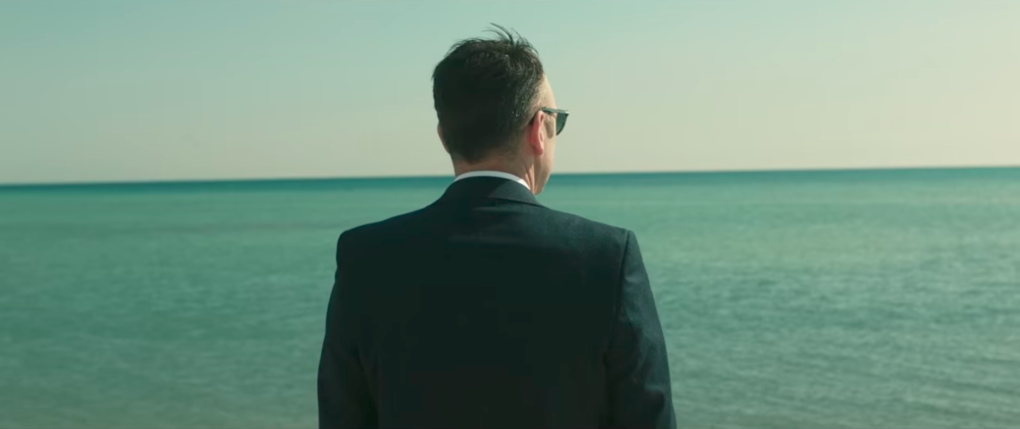Europe is now faced with the greatest human migration crisis since World War II, with African and Middle Eastern migrants fleeing civil war, persecution, and economic hardship, taking shoddy boats across the Mediterranean to the promise of a better life. The number of dead on the shores of Lampedusa reached over 2,000 in 2015. The European Union developed an international taskforce of specialized police to manage a system of increased cooperation with non-European police forces to obstruct irregular immigration. Released in Italian theaters on September 7, 2017, Andrea Segre’s film L’Ordine delle cose, focuses on the work of this taskforce, artfully exposes the systems of power that perpetuate this humanitarian crisis in the name of security. The film was previewed at Queens College, City University of New York (CUNY) on October 25 as part of City University of New York’s annual 2017 Made in Italy Festival: Arts + Cultures, (Queens College and The Graduate Center), which celebrates the best of Italian contemporary filmmaking and opens debates on pressing issues including migration and understanding today’s Italy in a global context. In the wake of the anxieties around U.S. immigration policy and the suspension of DACA, issues of migration, movement, and barriers hit close to home for an audience of students in the world’s immigration capital —the borough of Queens, known as the most diverse borough in the US.
Segre often works with the theme of migration, as he did with I sogni del lago salato (2015), Come il peso dell’acqua (2014), Io sono Li (2011), Mare chiuso (2012), and perhaps most famously, Come un Uomo Sulla Terra (2008), usually from the perspective of the migrant. This film deftly reverses perspectives, showing the fictional life of a senior official for the Italian Interior Ministry who specializes in international missions against irregular immigration. Corrado Rinaldi, elegantly played by Paolo Pierobon, navigates the very real social context of negotiations between Italy and Libya around migration. Corrado moves back and forth between a quiet, bourgeois life in Padua with his family, and visiting Tripoli, where, tasked with “getting results” —tangible, news-worthy decreases in the number of migrants reaching Europe — he works to ensuring Libyan cooperation with the Italian Coast Guard through the diplomatic coercion of powerful Libyan police officials. Intercut with his journeys are quiet scenes set in Corrado’s luxury hotel suite in Tripoli and in his immaculate home using his Wii reveal that Corrado is a former Olympian fencer. His training in the time-honored tradition of violent sparring sanitized into an elite, gentleman’s sport works as a psychological metaphor for his comfort with the remove from which the games of statecraft and deal-making take place from the migrant lives that they affect, and sometimes take. Just as fencers spill no blood in the ring, statesmen would have us believe that their negotiations leave no blood on the negotiating table, while the lives of migrants become increasingly vulnerable.

Corrado clearly believes in this bloodlessness until he visits a center for asylum seekers, or “hotspot” in Tripoli. It is clearly a glorified detention center, home to unspeakable violence. The presence of a hidden dead body confirms the suspicion that those running the centers do business with human traffickers, providing them with migrants for a fee and extending migrant circulation between jail, detention centers, and transit routes. (This portrayal closely resembles the reality described by many survivors of these routes interviewed in Segre’s other films. The centers are partly funded by the Italian government, an effort that began as a collaboration between Berlusconi and Gaddafi billed as a moment postcolonial peace.) Corrado insists that the centers alter their ways to respect human rights —a matter of necessary lip service. The depth of human rights infringement does not dawn on Corrado until a young Somali woman, Swede (Yusra Warsaw) approaches him in the center and asks him for assistance. Humanizing the migrant hordes Corrado must keep at bay, Swede exposes Corrado to the hopes and dreams that drive migrant to take such extraordinary risks. Seeing the blood on the negotiating table, he is faced with his conscience as he closes deals that aim only at forcibly returning refugees to where they continue to suffer or risk death.
The film could not be more timely, coming on the heels of the Paris Summit led by Emmanuel Macron in which European countries came together in support of funding programs to further strengthen Italian borders. Segre’s intervention reminds us to consider what’s at stake, reminding us that no rapier on the international landscape fails to spill blood.









